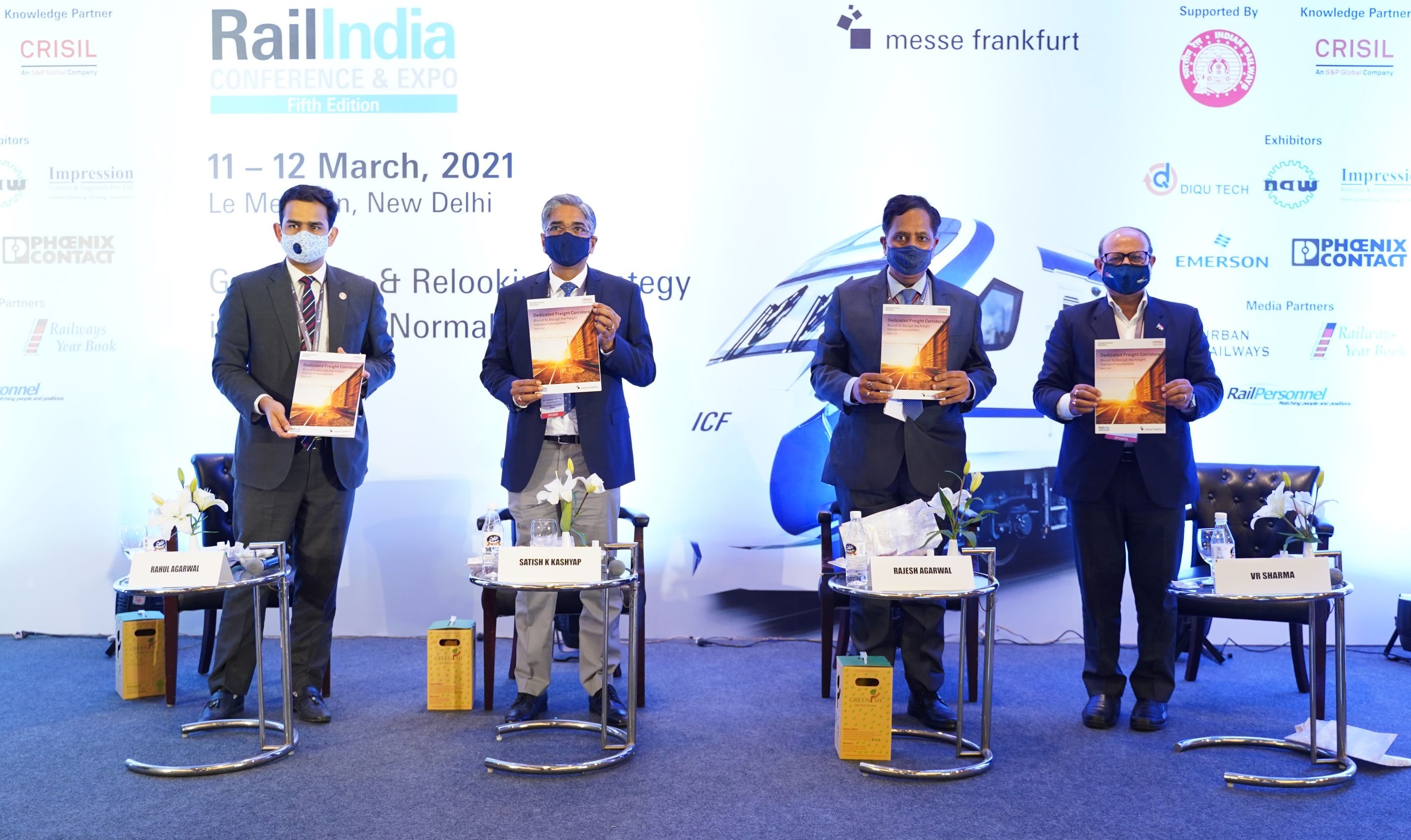Discussing railway industry’s renewed vision for the future, the fifth edition of Rail India Conference organised by Messe Frankfurt India concluded after two days of proactive networking and insightful knowledge sessions. The event garnered the presence of 120 industry professionals from the sector to interact on an array of industry topics, including: railway modernisation, post-pandemic approach, digital transformation and new investment plans for the Indian Railways.
The opening day of the conference was inaugurated by distinguished players from the industry.
Addressing the attendees during the inauguration, Mr Satish K. Kashyup, General Manager, Chittaranjan Locomotive Works (CLW), shared his vision for locomotives and electrification: “Present population of locomotives in Indian Railways is around 13,000 which also includes a large number of diesel locomotives. With Indian Railways (IR) majorly pushing electrification, our vision is to switch over to complete electric traction on broad gauge by the end of 2023. This year our production was slightly lower due to the lockdown, however IR’s goal is to produce more than 1,000 locomotives every year from here on.”
The conference was also graced by the presence of Mr Puneet Chawla, Chairman and Managing Director, RailTel Corporation of India Ltd, who shared crucial insights on the technological-front of the industry: “Increase in human-machine interaction and the onset of COVID has put digitalisation and IT services on a very fast track. Central and state government bodies as well as enterprises are turning to digital media with a focus on enhancing transparency and accountability across their services. Indian railways is not behind, and in fact is ahead in the implementation of IT services.”
Discussions on industry transformation prospects
Unveiled during the conference, CRISIL’s latest knowledge report on ‘Dedicated Freight Corridors’ provided a strong overview of government’s plans to improve the penetration of railways in freight-transportation.
According to the report, the initiatives of Indian railways to ramp up the infrastructure through the implementation of the Eastern and Western Dedicated Freight Corridor (DFC) projects has been fast tracked. The design features of DFCs are far more superior to the existing rail network from a freight-transport perspective. Once this freight-oriented infrastructure becomes operational, it can be a game-changer for the Indian railways in regaining edge over rival modes in logistic transportation.
In the passenger transportation segment, the disruptive impact of pandemic and the growing scale of population calls for faster, safer and more convenient railways in India. To achieve this, the Indian railways is set to undergo a major transformation in the coming years on the back of huge investments and focus on new technology. “The railway industry is going to transform, the speed of trains will increase, new technologies will come in, safety will become paramount and the expectations of passengers will also go up. It’s going to be a brilliant future for Indian railways as we will have 200 billion USD investment coming in the next five years and much more in years to come.” Mr. Rahul Agarwal, Head of Infrastructure and Financial Investments, Invest India, shared during the conference.
Meeting industry colleagues face-to-face after one year, Mr Agarwal also shared his experience from the physical conference: “It was a great initiative by Messe Frankfurt India to organise and bring together the railway sector through Rail India Conference, especially as we are slowly emerging out of the pandemic. It will not only help the event industry, but also help businesses get back on track and gain investments.”
A record outlay of INR 1,10,055 crore (USD 15.28 billion) allotted for the National Railway Plan 2030 will be channelled towards infrastructure development, improvement of passenger amenities, development of terminal facilities, signalling systems, safety works of ROBs & RUBs and high speed train projects. After a successful conclusion of the physical conference, Messe Frankfurt India is now looking forward to reunite rail industry stakeholders with more insightful discussions on the table, through its 2022 edition.
Source: https://www.crisil.com/en/home/our-analysis/reports/2021/03/dedicated-freight-corridors.html
Press information and photographic material: www.india-railway.com
Background information on Messe Frankfurt
Messe Frankfurt is the world’s largest trade fair, congress and event organiser with its own exhibition grounds. The Messe Frankfurt Group employs around 2,500* people in a total of 30 subsidiaries. The company generated annual sales of approximately €250* million in 2020 after having recorded sales of €738 million the previous year. Even in difficult times caused by the coronavirus pandemic, we are globally networked with our industry sectors. We have close ties with our industry sectors and serve our customers’ business interests efficiently within the framework of our Fairs & Events, Locations and Services business fields. One of the Group’s key USPs is its closely knit global sales network, which extends throughout the world. Our comprehensive range of services – both onsite and online – ensures that customers worldwide enjoy consistently high quality and flexibility when planning, organising and running their events. We are expanding our digital expertise with new business models. The wide range of services includes renting exhibition grounds, trade fair construction and marketing, personnel and food services. Headquartered in Frankfurt am Main, the company is owned by the City of Frankfurt (60 percent) and the State of Hesse (40 percent).
For more information, please visit our website at: www.messefrankfurt.com
* preliminary figures 2020
